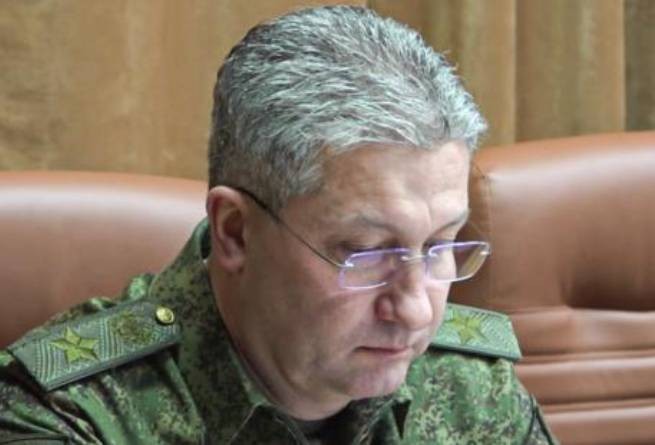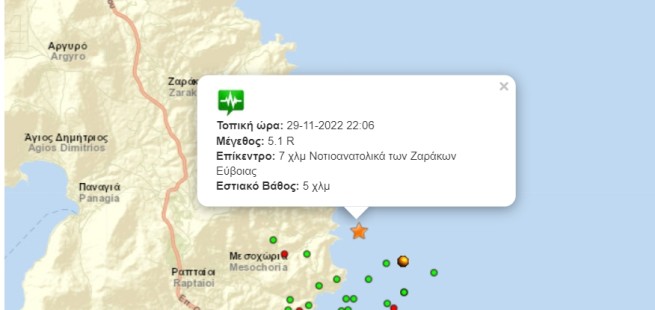A series of strong earthquakes of magnitude up to 5 on the Richter scale in the south of Evia on Tuesday caused concern among seismologists, according to them, the earthquake was the result of the appearance of a new, previously unknown fault in the earth’s crust.
An evening earthquake of magnitude 5 (according to other sources 5.3) shocked residents of the Attica metropolitan area because it awakened memories of a deadly 1999 earthquakewhich resulted in the death of 143 people and more than 2,000 were injured.
A previously unknown fault, which in the early morning of November 29 gave the first strong push to 4.8 pointsafter an hour 4.2 points, and after a series of small aftershocks at 22:06 5 points, is in an excited state due to previously low seismic activity in the area. The scientific community is asking for more time to collect more data to understand which earthquake is the main one, or if it is a series of earthquakes that is expected to last several days.
The problem lies in a previously unknown fault. Why did it suddenly activate?
“With a new earthquake, the data is changing, and we have to wait a while to see how things develop. As I have said many times today, residents should avoid old stone houses. The last earthquake had a long sequence of aftershocks,” said Akis, director of the Institute of Geodynamics. Tselendis, who on Wednesday morning said more than 80 aftershocks had been recorded overnight.
Seismologist Gerasimos Papadopoulos, member of the Board of Governors of the Hellenic Mediterranean University and UNESCO Fellow, speaking of yesterday’s magnitude 5 quake, wrote: “On Tuesday morning I wrote: ‘Still not certain that 4.8 was the main quake. We need more evidence. Nature has given us more evidence. After a Richter score of 5, I conclude that 4.8 was not the main one.”
Of course, we also understood this, although we are not seismologists. Any earthquake with a greater magnitude is more … major than the previous ones.
The problem is different. Could the activation of this unknown fault energize other faults that have led to deadly earthquakes in the past?
Because nearby there is a fault of Parnita and Alkionida. They have not produced major earthquakes for two decades, and there is reason to fear that they are accumulating energy for a powerful earthquake similar to that in 1999.
Residents of Zaraka Evia and Karystos were sleeping in fear of aftershocks, and yesterday the first reports of damage to houses began to arrive. By decision of the mayor, schools in the municipality of Karystos will be closed today, Wednesday (30/11), after a new earthquake that shook southern Euboea.
Speaking on ERT on Wednesday morning, Gerasimos Papadopoulos said that if there had been only 4.8 on the Richter scale yesterday, it would have been a major quake with a high probability, but since there were continuous quakes for 40 days, they began to suspect the presence a new, previously unknown fault in the earth’s crust. “That’s why we’re wondering if this is a major quake, a 5 on the Richter scale was recorded last night. All possibilities are open, we’re evaluating the situation and we’ll patiently see if it’s really a major quake. 5 is a dangerous magnitude and we’ve seen a lot surprises,” he said.
Regarding the seismic history of the region, Papadopoulos explained: “This area does not have a significant history of strong earthquakes, but this is not a guarantee that they will not get stronger. And I say this because in Greece and elsewhere in the world we have examples strong earthquakes that occurred in areas that we did not know about, as happened in 1999 with the deadly one in Parnit.”
The fact that for many years and until yesterday this area in the south of Evia did not give strong earthquakes more than 4 on the Richter scale, and up to 4 points they were single, if not rare, is enough to consider this area one of the safest. (relative to other areas) in Greece.
Ultimately, no area in Greece can be considered safe. The movement of tectonic plates does not depend on our will and our desires.







More Stories
Greece must transfer the Patriot PAC-3 system to Ukraine with US “guarantees” against the Turkish threat
How will the confiscation of Russian assets affect the global financial system?
TikTok ban in the USA: Americans force the owner company to sell its assets